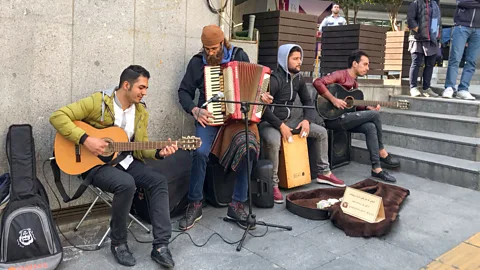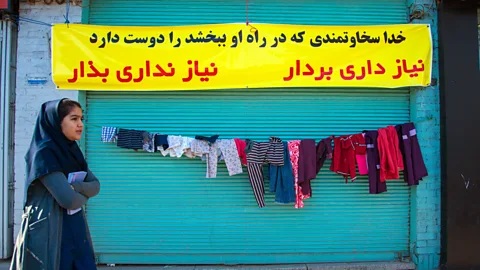Four countries with a tradition of kindness
 Gallo Images/Getty Images
Gallo Images/Getty ImagesActs of kindness have come to define the coronavirus pandemic, but in some nations, traditions of generosity and helping one another go back centuries.
Acts of kindness have come to define the coronavirus pandemic, whether that’s tales of Italians singing in unison on their balconies or communities applauding the medical professionals on the frontline. These stories have the ability to make us feel that we’re bigger than just this crisis, and that together we can overcome our fears.
That’s why BBC Travel is celebrating those places around the world that already have a long tradition of generosity and helping one another. From the ancient Greek concept of hospitality to the Persian poets espousing kindness, these traditions will shine a light on the goodness that already exists across the planet, as well as give us new ideas of how to live our best lives going forward.
Philoxenia, Greece
In Greece, guests are typically treated like guests of honour, with a simple dinner invitation usually translating to a veritable feast at which the visitor’s wine glass is kept topped up by the attentive host. While this is characteristic of many cultures today, the cradle of Western civilisation is widely thought to have invented the tradition.
 frantic00/Getty Images
frantic00/Getty ImagesIn Ancient Greece, the proper provision of hospitality was considered a commandment of the gods, specifically Zeus Xenios, the god of foreigners or strangers. Should a weary traveller arrive on one’s doorstep, the host was obliged to welcome them with food and shelter before asking any questions, whether they knew the guest or not. In return, the guest was obliged to show respect to the host via gestures such as staying only as long as necessary. For either party to fail in their obligation was considered an offense worthy of Zeus Xenios’ divine wrath.
Read more: The European city that loves strangers
Taken from the Greek words xenia (stranger) and philo (care for), the concept became known as philoxenia, or love of strangers (and later hospitum, or hospitality), scenes of which are found throughout the works of Homer. The Odyssey, for example, recounts its protagonist’s tireless search for hospitality on his journey home to Ithaca, while the Iliad recalls the Greeks’ reaction to a blatant violation of the proper host-guest conduct during the Trojan War, which occurred when Paris, leaving Sparta, “stole” his host’s wife, Helen of Sparta.
Along with being particularly gracious in their hospitality, this tradition of kindness is kept alive today through small gestures such as offering a friendly smile to a stranger, or escorting a lost traveller to their destination rather than simply providing directions.
Taarof, Iran
The first snows don’t tend to fall in Mashhad, tucked up in the mountains of north-east Iran, until January, but by December, the nation’s second-largest city is already in the icy grip of winter. Reportedly out of concern for the city’s sizeable homeless population, an anonymous local took to the streets in December 2015, painting a wall in bright colours and installing pegs and hangers. Beside it, a painted message in Farsi read: “If you don’t need it, leave it. If you need it, take it.”
 Sarah Reid
Sarah ReidMashhad’s residents answered the call with enthusiasm, donating warm clothes they could spare. An instant hit on social media, these “walls of kindness” soon spread throughout Iran and beyond, with the initiative taking various forms.
Bakeries began leaving out baskets of bread encouraging those who couldn’t pay to help themselves; and as buskers strummed their guitars on street corners, signs in their tip jars invited passers-by to take the money if they needed it. Tehran’s fast-food outlets introduced a system whereby customers could pin a meal order to a noticeboard for someone less fortunate to trade in, reminiscent of Italy’s caffè sospeso (suspended coffee) tradition revived in Naples around a decade ago, whereby a cafe patron can buy a coffee in advance for someone less well-off.
Read more: The Persian art of etiquette
While charitable giving has always been an important Islamic custom, the walls of kindness movement is rooted in Persian culture, which reveres the language of ancient poets such as Rumi, who espoused the virtues of kindness. This spirit of kindness has also manifested in taarof, or the Persian art of etiquette, in which politeness holds the place of honour in every social interaction. Despite the coronavirus pandemic that has tested the nation’s philanthropic spirit to the limit, these gestures of kindness towards strangers continue today.
 Eric Lafforgue/Getty Images
Eric Lafforgue/Getty ImagesUbuntu, South Africa
The word comes from the Nguni languages spoken by some of Africa’s first peoples, but ubuntu didn’t appear in written sources until the mid-19th Century, rising to prominence in the midst of South Africa’s transition from the apartheid regime to a democracy that included all races.
While definitions of ubuntu have varied over the years, the Nguni proverb “umuntu ngumuntu ngabantu” (often translated as “a person is a person through other persons”) is most commonly used to describe the concept.
In practice, ubuntu is a belief that the common bonds of a group are more important than the divisions within it. As Nelson Mandela once wrote, ubuntu is, “The profound sense that we are human only through the humanity of others; that if we are to accomplish anything in this world, it will in equal measure be due to the work and achievements of others.” In South Africa, the philosophy manifests in displays of kindness and compassion, particularly towards people of different cultural backgrounds.
 Gallo Images/Getty Images
Gallo Images/Getty ImagesFormer South African archbishop Desmond Tutu harnessed the concept of ubuntu when leading the nation’s Truth and Reconciliation Commission in the mid-1990s, with his Christian perception recognising the importance of forgiveness, reconciliation and peaceful coexistence. In a comment that has particular poignancy in 2020, Tutu once said that “Ubuntu speaks particularly about the fact that you can’t exist as a human being in isolation. It speaks about our interconnectedness. You can't be human all by yourself, and when you have this quality – ubuntu – you are known for your generosity.”
Omotenashi, Japan
Often described as the world’s most polite country, Japan’s tradition of selfless hospitality is the product of a tradition known as omotenashi. Literally translating to “spirit of service”, this cornerstone of Japanese culture is grounded in the centuries-old ritual of the sado (tea ceremony), which requires a high degree of attentiveness on the host’s behalf to ensure their guests’ every need is fulfilled, without expecting anything in return. The guests, conscious of the host’s efforts, respond by showing an almost reverential gratitude. Both parties thus create an environment of harmony and respect.
 AzmanL/Getty Images
AzmanL/Getty ImagesWhile perhaps no Japanese custom better representsomotenashi than the sado, omotenashi has become a way of life in Japan. Staff in shops and restaurants greet customers with a warm “irasshaimase” (welcome) as you step inside; shinkansen (bullet train) cleaners bow to boarding passengers; and taxi drivers open the doors for passengers automatically. An even greater level of politeness is shown to people outside one’s own group, with foreigners typically accorded lavish courtesies.
Read more: The world’s most polite country
Butomotenashi isn’t Japan’s only tradition of kindness. Known as senbetsu, the practice of giving a gift to someone departing on holiday, or perhaps leaving their job, dates back to ancient times, when gifts were bestowed on people setting off on pilgrimages as a way of ensuring the traveller would enjoy some comfort on their journey.
Neighbourly love is an uplifting and emotionally engaging BBC Travel series that shows how acts of generosity can have profound effects in destinations around the world.
Join more than three million BBC Travel fans by liking us on Facebook, or follow us on Twitter and Instagram.
If you liked this story, sign up for the weekly bbc.com features newsletter called "The Essential List". A handpicked selection of stories from BBC Future, Culture, Worklife and Travel, delivered to your inbox every Friday.
{"image":{"pid":""}}
Singapore’s modern kindness movement
Launched in 1997 in response to then-prime minister Goh Chok Tong’s call for Singapore to become a more gracious society by the 21st Century, the Singapore Kindness Movement encourages the island’s citizens to make a commitment to gracious living through simple acts of kindness in their daily activities. During the coronavirus pandemic, the organisation has urged Singaporeans to help “fight the virus with kindness” through acts such as making thank-you cards for frontline workers, and checking in on friends and colleagues via socially responsible methods.
